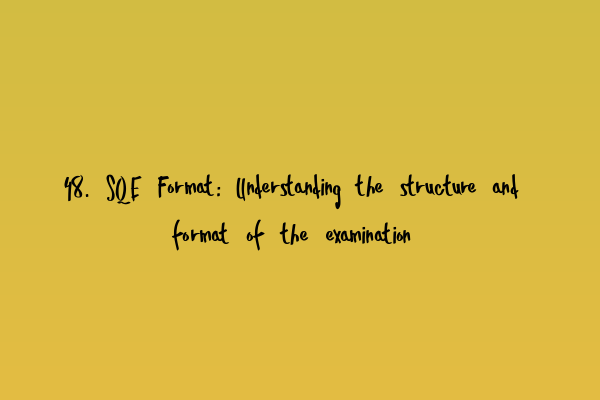48. SQE Format: Understanding the structure and format of the examination
The Solicitors Qualifying Examination (SQE) is a crucial step in your journey towards becoming a qualified solicitor. It is designed to test your knowledge, skills, and abilities in various areas of law and legal practice. To succeed in the SQE, it is important to understand its structure and format. In this article, we will provide a comprehensive overview of the SQE format and offer valuable insights to help you prepare for the examination.
1. Introduction to SQE Format
The SQE is divided into two stages: SQE1 and SQE2. Each stage consists of a combination of multiple-choice questions (MCQs) and practical legal skills assessments (PLSAs). Let’s take a closer look at each stage:
1.1 SQE1
SQE1 focuses on testing your knowledge of substantive and procedural law. It comprises of two parts:
a) Functioning Legal Knowledge (FLK): This part assesses your understanding of seven key areas of law, including criminal law, contract law, and tort law. The FLK is assessed through multiple-choice questions (MCQs).
b) Practical Legal Skills (PLS): This part evaluates your application of legal skills, such as client interviewing, advocacy, and legal research. The PLS is assessed through written and oral tasks.
Conquer the Multiple Choice Questions (MCQ) in SQE1
1.2 SQE2
SQE2 focuses on testing your practical legal skills in the context of a realistic legal scenario. It comprises four assessments:
a) Advocacy & Communication Skills: This assessment evaluates your skills in oral and written advocacy, such as legal drafting and presenting a case.
b) Legal Research: This assessment tests your ability to conduct legal research and analyze the information effectively.
c) Legal Writing: This assessment assesses your skills in drafting legal documents, including contracts, opinions, and witness statements.
d) Client Interviewing & Completion of a Client Matter: This assessment evaluates your ability to communicate effectively with clients and provide appropriate legal advice.
Interactive mock tests for SQE: Enhancing engagement and learning
2. Tips for Success
Preparing for the SQE requires a strategic approach. Here are some tips to help you succeed:
2.1 Understand the Exam Blueprint
Familiarize yourself with the SQE examination blueprint, which outlines the content areas and weighting of each examination component. This will help you allocate your study time and focus on areas that carry greater weightage.
2.2 Practice with SQE Sample Papers
Make use of SQE sample papers to get a feel for the questions and formats used in the examination. Regular practice will help you develop familiarity with the examination style and improve your time management skills.
SQE Sample Papers: Practice for Exam Success
2.3 Utilize Interactive Mock Tests
Interactive mock tests can enhance your engagement and learning experience by simulating real examination conditions. These tests provide valuable feedback and help you identify areas for improvement.
Interactive mock tests for SQE: Enhancing engagement and learning
2.4 Focus on Key Concepts
Identify the key concepts and focus areas in SQE1 and SQE2. Mastering these concepts will improve your overall performance in the examination. Prioritize your study time accordingly.
Focus Areas in SQE1 and SQE2: Mastering Key Concepts
2.5 Adjust Your Study Strategy
Based on your performance in mock tests and practice papers, adjust your study strategy. Analyze your strengths and weaknesses and allocate more time to areas that need improvement. Regularly reviewing and adjusting your study plan will maximize your chances of success.
Adjusting Your SQE Strategy Based on Mock Performance
Conclusion
Understanding the structure and format of the SQE is essential for effective exam preparation. By familiarizing yourself with the different components and requirements of each stage, utilizing practice materials, and adjusting your study strategy, you can increase your chances of success in the examination. Remember to stay organized, focused, and maintain a disciplined study routine. Good luck with your SQE preparation!
